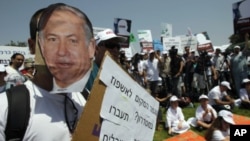The Israeli government is offering to open talks with economic protesters who have captured the attention of the nation.
Israeli Prime Minister Benjamin Netanyahu says he is setting up a ministerial committee to open a dialogue with a growing protest movement that is outraged over the high cost of living.
Netanyahu told the Cabinet that there is “genuine distress” among the public, and that the government must take steps to deal with the economic situation seriously and responsibly.
He spoke a day after the biggest protests yet.
Tens of thousands of Israelis took to the streets in cities around the country Saturday to protest the skyrocketing price of housing, food and gasoline. A modest apartment in Jerusalem or Tel Aviv can cost $500,000, yet the average salary in Israel is about $2,500 a month. Teachers and civil servants typically earn less than $2,000 a month.
Inbal Halperin has been living in a tent camp in Jerusalem, among protesters pressing the government for cheaper housing. She says Netanyahu’s offer for dialogue is not enough.
“He’s kind of throwing sayings into the air without establishing them with any frame. So how many houses will be built, who will get those houses, in how many years? I mean he’s not saying anything concrete,” said Halperin.
Israel’s economy is booming with an annual growth rate of 5 percent, among the fastest in the world. Unemployment stands at just 5.7 percent, the lowest in 20 years. But high prices are weighing down on the middle class.
The protests that began more than six weeks ago have been dubbed the “Middle Class Revolution,” and they point to a widening gap between rich and poor in Israel.
Israeli Gov’t Opens Dialogue with Protesters




